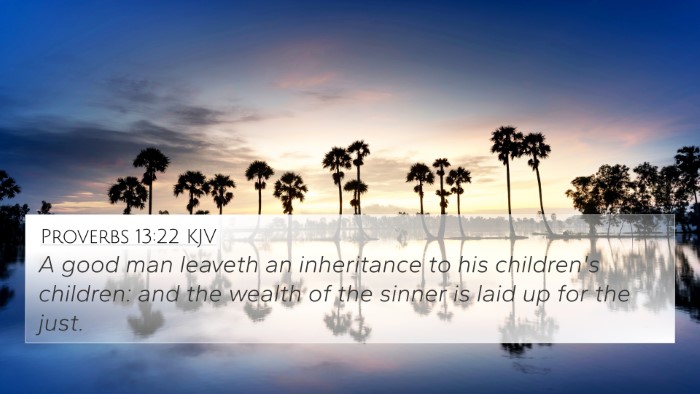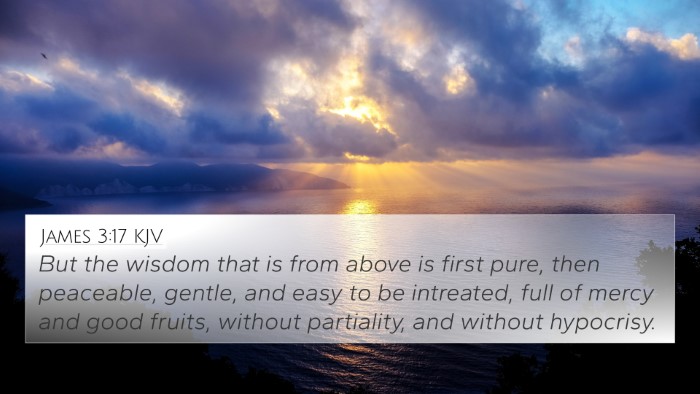Understanding Ecclesiastes 2:26
Ecclesiastes 2:26 states, “For to the one who pleases him God has given wisdom and knowledge and joy, but to the sinner he has given the business of gathering and collecting, only to give to one who pleases God. This also is vanity and a striving after wind.” This verse offers profound insights into the nature of God's gifts and the futility of pursuing worldly gain without a relationship with Him.
Interpretation and Analysis
This verse carries deep meaning concerning divine reward and retribution. Drawing from the insights of Matthew Henry, it reflects on how God rewards those who live according to His will with wisdom, knowledge, and joy. In contrast, those who choose a sinful path are burdened with labor that ultimately benefits those who serve God, highlighting the transient nature of earthly endeavors.
Key Themes
- Divine Favor: Those who please God are granted not just material blessings but spiritual enrichment.
- Futility of Sin: The burdensome work of the sinner ends in vain pursuits, emphasizing the vanity of life without God.
- Joy vs. Labor: True joy is a gift from God, contrasting with the toil of the sinner that leads to emptiness.
Connections Between Bible Verses
This verse connects to several other scriptural passages, providing a broader understanding of its implications:
- Proverbs 10:22: “The blessing of the Lord makes rich, and he adds no sorrow with it.” This reinforces the notion that God's gifts bring true joy.
- Psalm 127:2: “It is vain that you rise up early and go late to rest, eating the bread of anxious toil; for he gives to his beloved sleep.” This highlights the futility of labor without God’s blessing.
- James 1:5: “If any of you lacks wisdom, let him ask of God.” Here, the verse encourages seeking divine wisdom, aligning with the theme of Ecclesiastes 2:26.
- Ecclesiastes 3:13: “Everyone should eat and drink and take pleasure in all his toil—this is God’s gift to man.” This emphasizes that enjoyment in work is ultimately a divine gift.
- Matthew 6:19-21: “Do not lay up for yourselves treasures on earth... but lay up for yourselves treasures in heaven.” This connects to the transient nature of earthly pursuits described in Ecclesiastes.
- Proverbs 21:30: “No wisdom, no understanding, no counsel can avail against the Lord.” It emphasizes that human efforts are futile without divine guidance.
- Romans 8:28: “And we know that for those who love God all things work together for good.” Signifying that the outcomes of those who love God are beneficial, resonating with the rewards discussed in Ecclesiastes.
Comparative Bible Verse Analysis
To fully grasp the meaning of Ecclesiastes 2:26, a comparative analysis with other verses is vital. Utilizing biblical concordance tools and cross-reference guides can enhance understanding:
- Identifying Connections: Understand that Ecclesiastes often discusses the void in life without God, a theme echoed in Job's affliction (Job 1:21).
- Thematic Bible Verse Connections: The idea of true wisdom and joy being a gift from God resonates throughout the wisdom literature, making links to books such as Proverbs and Job.
- Bible Reference Resources: Utilizing tools like a Bible concordance can help trace how these themes appear throughout Scripture.
Conclusion
Ecclesiastes 2:26 serves as a reminder of the overarching narrative present in the Bible: that true fulfillment comes from God. Understanding the interplay between divine favor and the outcomes of life leads to the realization that a relationship with God is the source of authentic wisdom, joy, and purpose.
Further Study and Reflection
For those seeking to delve deeper into the Scripture's message, consider the inter-Biblical dialogue that this verse invokes. Reflect on how the tragic futility experienced by the sinner can be contrasted with the fullness found in God’s favor, as emphasized in various scriptural cross-references.



















